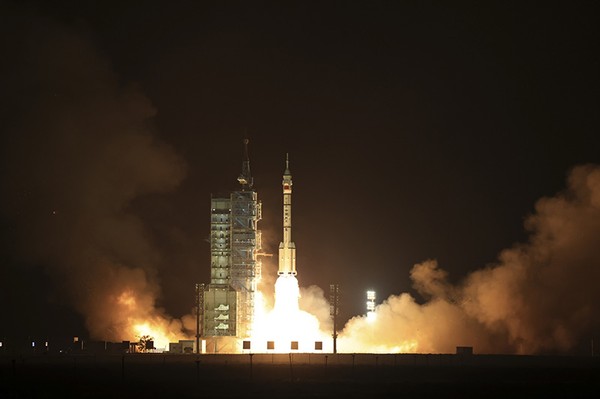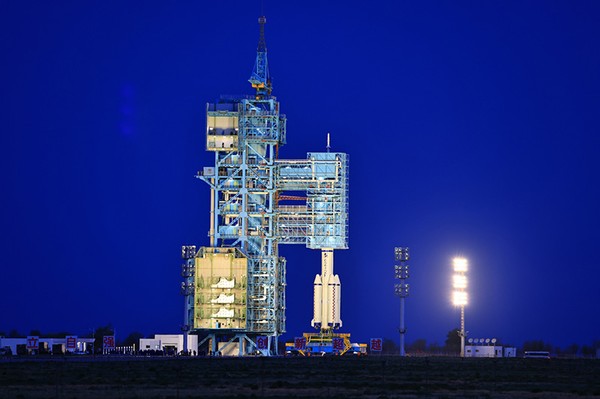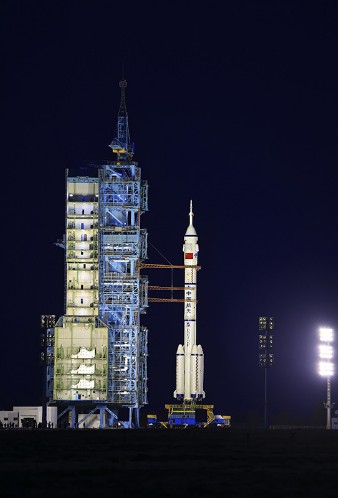
The Shenzhou-18 manned spaceship, atop a Long March-2F carrier rocket, blasts off from the
Jiuquan Satellite Launch Center in northwest China, April 25, 2024. [Photo/Xinhua]
JIUQUAN, April 25 -- China on Thursday launched the Shenzhou-18 manned spaceship to send three taikonauts to its orbiting Tiangong space station for a six-month mission.
The spaceship, atop a Long March-2F carrier rocket, blasted off from the Jiuquan Satellite Launch Center in northwest China.
The Shenzhou-18 crew members are Ye Guangfu, Li Cong and Li Guangsu, with Ye as the mission commander, according to the China Manned Space Agency (CMSA).
The Shenzhou-18 mission marks Ye's second journey into space, following his previous role as a crew member during the Shenzhou-13 mission from October 2021 to April 2022. Li Cong and Li Guangsu are both on their first-ever space adventure.
SPACE "AQUARIUM" AND "GARDEN"
The crew will utilize the scientific experiment cabinets and extravehicular payloads to carry out more than 90 experiments in the fields of basic physics in microgravity, space material science, space life science, space medicine and space technology, said Lin Xiqiang, deputy director of the CMSA, at Wednesday's press conference.
A unique task for the three pilot-turned taikonauts is to create an "aquarium" and raise fish in zero gravity.
They will create a simplified version of an aquatic ecosystem using zebrafish and algae to study how the space environment affects their growth and system balance.
The "aquarium" is 1.25 liters in volume and can accommodate four small fish. But if the experiment succeeds, it will be a significant breakthrough to cultivate vertebrates in China's space program. Not only will the taikonauts find joy in the space "aquarium," but it may also pave the way for their future counterparts to enjoy nutritious fish from their own in-orbit harvests.
"The next step in our research involves conducting experiments on fruit flies and mice," said Cang Huaixing, a chief researcher for the space station's scientific experiments, at the Technology and Engineering Center for Space Utilization under the Chinese Academy of Sciences.
Taikonauts in orbit will also be involved in an experiment of cultivating plants. The purpose is to analyze the changes in the function and gene expression of plant stem cells in a microgravity environment. According to scientists, this research will provide theoretical support for designing crops that can adapt to outer space conditions.
More than 100 Arabidopsis seeds will be grown and nurtured in space for approximately four weeks. The crew aboard the space station will freeze them at minus 80 degrees Celsius in real-time and bring them back to Earth for further analysis and research.
In addition to the two experiments related to fish and plant, the crew will also conduct molecular research on the co-origin of proteins and nucleic acids, as well as the origin of codons. Furthermore, they will test a newly developed spacecraft coating material.

This photo shows the Shenzhou-18 manned spaceship atop a Long March-2F carrier rocket at the
Jiuquan Satellite Launch Center in northwest China, April 25, 2024. [Photo/Xinhua]

This photo shows the Shenzhou-18 manned spaceship atop a Long
March-2F carrier rocket at the Jiuquan Satellite Launch Center in
northwest China, April 25, 2024. [Photo/Xinhua]
Scan to open the current page on the phone
 Anhui ICP Registration No.05015512-1 Anhui Internet Security Registration No.34120002001529 Website ID:3412000010
Anhui ICP Registration No.05015512-1 Anhui Internet Security Registration No.34120002001529 Website ID:3412000010